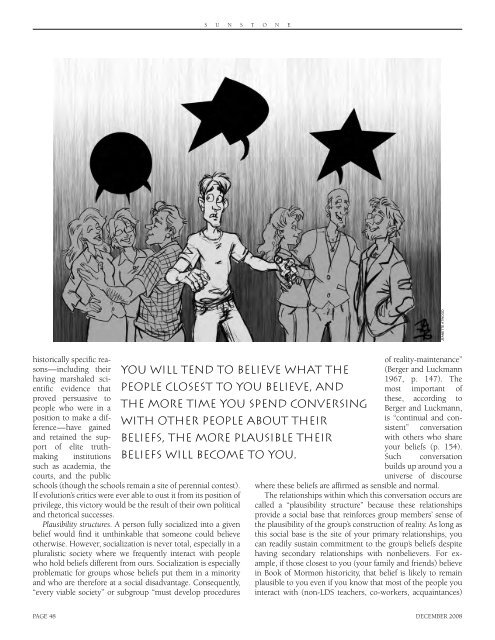Download Entire Issue PDF - Sunstone Magazine
Download Entire Issue PDF - Sunstone Magazine
Download Entire Issue PDF - Sunstone Magazine
Create successful ePaper yourself
Turn your PDF publications into a flip-book with our unique Google optimized e-Paper software.
S U N S T O N E<br />
JEANETTE ATWOOD<br />
historically specific reasons—including<br />
their<br />
having marshaled scientific<br />
evidence that<br />
proved persuasive to<br />
people who were in a<br />
position to make a difference—have<br />
gained<br />
and retained the support<br />
of elite truthmaking<br />
institutions<br />
such as academia, the<br />
courts, and the public<br />
schools (though the schools remain a site of perennial contest).<br />
If evolution’s critics were ever able to oust it from its position of<br />
privilege, this victory would be the result of their own political<br />
and rhetorical successes.<br />
Plausibility structures. A person fully socialized into a given<br />
belief would find it unthinkable that someone could believe<br />
otherwise. However, socialization is never total, especially in a<br />
pluralistic society where we frequently interact with people<br />
who hold beliefs different from ours. Socialization is especially<br />
problematic for groups whose beliefs put them in a minority<br />
and who are therefore at a social disadvantage. Consequently,<br />
“every viable society” or subgroup “must develop procedures<br />
of reality-maintenance”<br />
(Berger and Luckmann<br />
1967, p. 147). The<br />
most important of<br />
these, according to<br />
Berger and Luckmann,<br />
is “continual and consistent”<br />
conversation<br />
with others who share<br />
your beliefs (p. 154).<br />
Such conversation<br />
builds up around you a<br />
universe of discourse<br />
where these beliefs are affirmed as sensible and normal.<br />
The relationships within which this conversation occurs are<br />
called a “plausibility structure” because these relationships<br />
provide a social base that reinforces group members’ sense of<br />
the plausibility of the group’s construction of reality. As long as<br />
this social base is the site of your primary relationships, you<br />
can readily sustain commitment to the group’s beliefs despite<br />
having secondary relationships with nonbelievers. For example,<br />
if those closest to you (your family and friends) believe<br />
in Book of Mormon historicity, that belief is likely to remain<br />
plausible to you even if you know that most of the people you<br />
interact with (non-LDS teachers, co-workers, acquaintances)<br />
You will tend to believe what the<br />
people closest to you believe, and<br />
the more time you spend conversing<br />
with other people about their<br />
beliefs, the more plausible their<br />
beliefs will become to you.<br />
PAGE 48 DECEMBER 2008

















